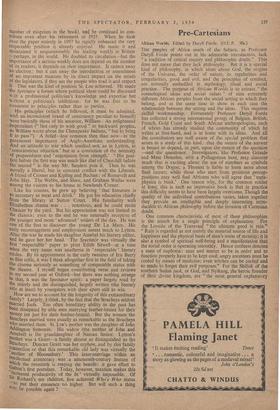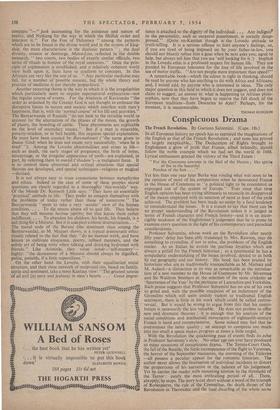Pre-Cartesians
African Worlds. Edited by Daryll Fordo. (O.U.P. 30s.)
THE peoples of Africa south of the Sahara, as Professor Daryll Forde points out in his admirable introduction, lack " a tradition of critical inquiry and philosophic doubt." This does not mean that they lack philosophy. But it is a special kind of philosophy, in which ideas about God, the origins of the Universe, the order of nature, its regularities and irregularities, good and evil, and the principles of conduct, are normally embedded in mythology, ritual and social practice. The purpose of African Worlds is to extract " the cosmological ideas and social values " of nine extremely different African peoples from the social setting to which they belong, and at the same time to show in each case the relationship between the setting and the ideas. This requires skilful workmanship. Fortunately Professor Daryll Forde has collected a strong international group, of Belgian, British, French, Gold Coast and South African anthropologists, each of whom has already studied the community of which he Writes at first-hand, and is at home with its ideas. And all the contributors are well aware of the special problem that arises in a study of this kind : that the nature of the answer is bound to depend. in part, upon the nature of the question —and the questioner. Investigators, like Professor Griaule and Mme Dieterlen, with a Pythagorean bent, may discover much that is exciting about the use of numbers as symbols among the Dogon; a Thomist is liable to learn more about final causes; while those who start from positivist presup- positions may well find Africans who will agree that ' meta- physics is bunk.' One reason why, for the common reader at least, this is such an impressive book is that in practice this difficulty seems to have been largely overcome. Though the quality of the individual contributions varies, taken together they provide an intelligible and deeply interesting intro- duction to African philosophy before the invasion of Cartesian doubt.
One common characteristic of most of these philosophies is the search for a single principle of explanation. For the Lovedu of the Transvaal " the ultimate good is rain."
Rain is regarded as not merely the material source of life and happiness and the physical basis of than's sense of security; it is also a symbol of spiritual well-being and a manifeStation that the social order is operating smoothly. Hence coolness denotes a state of euphoria: man and matter to be in order and to function properly have to be kept cool; angry ancestors must be cooled by means of medicine; even witches can be cooled and so made to forget their evil purposes." For the Shilluk of the southern Sudan juok, or God, and Nyikang, the heroic founder of their divine kingdom, are " the most general explanatory concepts "—"juok accounting for the existence and nature of reality, and Nyikang for the way in which the Shilluk order and interpret it." For the Fon of Dahomey " among the patterns which are to be found in the divine world and in the system of king- ship, the most characteristic is the dualistic pattern " ; the dual divinity, creator or demiurge, Mawu-Lisa, reflected in the double monarch, " two courts, two bodies of exactly similar officials, two series of rituals in honour of the royal ancestors." Once the prin- ciple of explanation is established, and a relatively coherent world view built upon it, facts have to conform to concepts. In this Africans are very like the rest of us. " Any particular medicine may fail, for a number of possible reasons, but the whole theory and practice of medicine is not thereby jeopardized."
Another recurring theme is the way in which it is the irregularities which particularly seem to require supernatural explanation—not the regular course of events. For the Abaluyia of Kavirondo "the order as ordained by the Creator God is not thought to embrace the disruptive forces in nature and society which interfere with man's happiness, that is, with the 'normal course' of his life and activities." The Banyarwanda of Ruanda "do not look to the invisible world to account for the alternation of the phases of the moon, the growth of plants, the breeding of cattle, These phenomena are explicable on the level of secondary causes." But if a man is miserable, poverty-stricken, or in bad health, this requires special explanation. He must have been created by Ruremakwaci ("the name given to Imana [God] when he does not create very successfully, 'when he is tired' "). Among the Lovedu abnormalities and crises in life— such as death, the early stages of pregnancy, the birth of twins, miscarriage, or the irregular appearance of teeth—are explained, in part, by referring them to niuridi ('shadow')--a malignant force. It is to control these abnormal and critical situations that special theories are developed, and special techniques—religious or magical —devised.
It. is not always easy to trace connections between metaphysics and ethics. Indeed in the case of some of these peoples moral questions are clearly regarded in a thoroughly `this-worldly' way. Of the Mende Dr. Kenneth Little says: "They have an essentially 'practical' attitude to life. They prefer to concern themselves with the problems of today , rather than those of tomorrow." The Banyarwanda "seem to take a very 'secular' view of the human condition. . . . To die means above all to quit life. They believe that they will become bazimu [spirits] but that leaves them rather indifferent.... To abandon his children, his herds, his friends, is a sad thing for a Mututsi. But it is accepted without dramatization. ..." The moral code of the Batutsi (the dominant class among the Banyarwanda), as M. Maquet shows, is a typical aristocratic ethic: closely related to the fact that they "do no manual work, and have leisure to cultivate eloquence, poetry, refined manners, and the subtle art of being witty when talking and drinking hydromel with friends." Like Aristotle, they value itonde—'self-mastery'- highly: "the demeanour of a Mututsi should always be dignified, polite, amiable, if a little supercilious."
On the other hand the Lovedu, with their equalitarian social structure, and their close network of reciprocal ties, based on family, cattle and sentiment, take a more Kantian view: "The greatest source of all evil [is] envy and jealousy in men's hearts. . . . Great impor-
Lance is attached to the dignity of the individual. . .. Any indignity to the personality, such as corporal punishment, is socially disap- proved." (Quite un-Kantian though is the Lovedu attitude to truth-telling. It is a serious offence to hurt anyone's feelings, so, if you are tired of being imposed on by your father-in-law, you should not bluntly refuse him a goat when he next asks you; agree to help, but always tell him that you are 'still looking for it.') Implicit in the Lovedu ethic is a profound respect for human life. They are puzzled by European tolerance for the loss of life involved in the use of motor traffic. "Are not people more important than speed?"
A remarkable book—which the editor is right in thinking, should be read by anyone who has anything to do with Africa and Africans; and, I would add, by anyone who is interested in ideas. The only major question in this field to which it does not suggest, and does not claim to suggest, an answer is: what is happening to African philo- sophies, now that they have begun to receive the full shock of the European tradition—from Descartes to Ayer? Perhaps, for the moment, it is unanswerable.
THOMAS HODGKIN



































 Previous page
Previous page